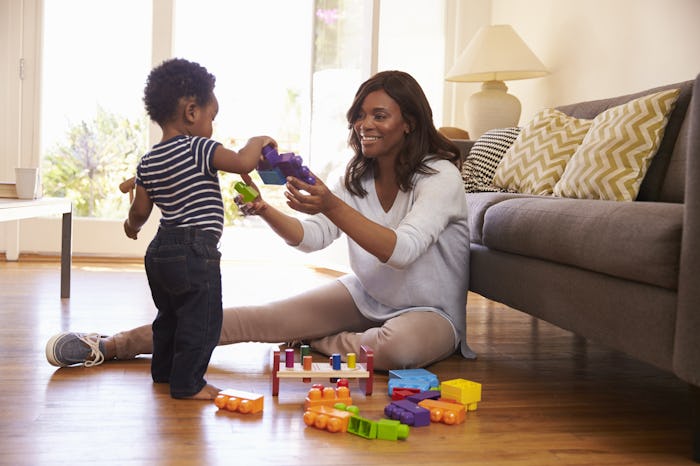Life

Actually, Your Toddler's Asking The Same Questions Over & Over For A *Good* Reason
I'm only human here. I try to be as patient and understanding as I can possibly be with my three boys, but there are a few things about motherhood that push me to the brink of my sanity, and one of them is being asked the same question 10 million times. Sometimes it feels like an actual conspiracy theory to drive me to the loony bin. Are they being annoying on purpose, or is there something I'm missing here? Why do toddlers ask the same questions over and over until their parents finally just go to the couch and open up a bottle of wine? Tell me there is a developmental reason for this.
As it turns out I reached out to a pediatrician who, well, did.
Dr. Jarret Patton, known as "the gentle giant" in the pediatric circles in which he offers consultations, says that young children are naturally inquisitive and their curiosity shouldn't be discouraged. "As part of their developmental process," Patton explains to Romper in an exclusive interview, "they tend to repeat questions. You must remember that children are working on their speech development, physical development, and intellectual development all the time."
So while it may seem to the parent that their child is simply not listening to the answer the first time, the truth may be that they are working on other areas of development — like speech — in tandem with actually obtaining information. When different areas of the brain are processing new gains simultaneously, it makes sense that the child would need a little extra time to let it all sink in.
According to Patton, the solution to streamlining the process (and salvaging what's left of your brain cells) is to engage more, not less, with your child's question. Patton tells Romper, "Young children may ask 'What's that?' to the same item. The repetition of the answer helps them gain the knowledge that they seek. If you answer 'apron' they will likely ask again and again because this is something new to them. If you answer in a more descriptive way like 'It's an apron, it is used to help keep my clothes clean when I cook. Can you say apron?' the developmental process hits both the intellectual component and the speech component that helps retain their new knowledge."
Patton's approach might require a bit more brain power from you in the short term, but it does give you a reminder to stop and take a moment to truly listen and respond to your child rather than rush through the conversation while you seek to accomplish other tasks at the same time. This connection is what we parents most want, yet it's often the area we feel we fail most in. Taking the time to use questions as opportunity for engagement can serve our relationship with our kids more than we realize.
And besides, says Patton, this stage of repetitive questions is not forever. "As children age they will repeat questions less," he assures me. "By the time they are in first grade, they should not be frequently repeating the same questions over and over again. If they do, perhaps a discussion with your child's teacher and physician is warranted."
I suppose that if I take into account the multiple areas of development my 3-year-old is working on all day, I can give him a break when it comes to hearing the same question 50 times in a row — especially if I know the phase will pass in a few years. In the meantime, I'll be trying to engage the conversation, encourage him to repeat new words, and treating myself to some extra nights of early bedtime and Netflix binges.
Check out Romper's new video series, Romper's Doula Diaries:
Check out the entire Romper's Doula Diaries series and other videos on Facebook and the Bustle app across Apple TV, Roku, and Amazon Fire TV.